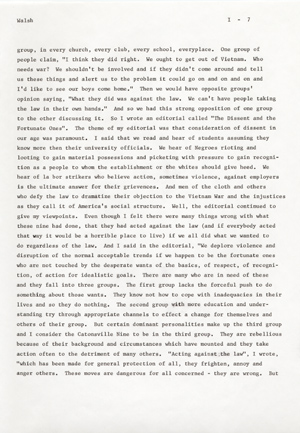 |
The Catonsville Nine's invasion and burning of the Catonsville draft board files: an interview with Jean S. Walsh given on March 30, 1973.
 |
11 / 15 |
 |



| Collection: |
Friends of Catonsville Library |
| Date: |
1973-03-30 |
| Date of Digitization: |
2004-03-31 |
| Source: |
Catonsville Library |
| Original Dimensions: |
28 x 22 cm |
| Creator: |
Walsh, Jean S. |
|
|
Description:
A transcript of a recorded interview with Jean S. Walsh, the editor of Catonsville's local newspaper, the Catonsville Times. She was present at the scene after the burning of draft records in Catonsville on May 17, 1968.
Transcription: group, in every church, every club, every school, everyplace. One group of
people claim, "I think they did right. We ought to get out of Vietnam. Who
needs war? We shouldn't be involved and if they didn't come around and tell
us these things and alert us to the problem it could go on and on and on and
I'd like to see our boys come home." Then we would have opposite groups'
opinion saying, "What they did was against the law. We can't have people taking
the law in their own hands." And so we had this strong opposition of one group
to the other discussing it. So I wrote an editorial called "The Dissent and the
Fortunate Ones". The theme of my editorial was that consideration of dissent in
our age was paramount. I said that we read and hear of students assuming they
know more then their university officials. We hear of Negroes rioting and
looting to gain material possessions and picketing with pressure to gain recogni-
tion as a people to whom the establishment or the whites should give heed. We
hear of labor strikers who believe action, sometimes violence, against employers
is the ultimate answer for their grievences. And men of the cloth and others
who defy the law to dramatize their objection to the Vietnam War and the injustices
as they call it of America's social structure. Well, the editorial continued to
give my viewpoints. Even though I felt there were many things wrong with what
these nine had done, that they had acted against the law (and if everybody acted
that way it would be a horrible place to live) if we all did what we wanted to
do regardless of the law. And I said in the editorial, "We deplore violence and
disruption of the normal acceptable trends if we happen to be the fortunate ones
who are not touched by the desperate wants of the basics, of respect, of recogni-
tion, of action for idealistic goals. There are many who are in need of these
and they fall into three groups. The first group lacks the forceful push to do
something about those wants. They know not how to cope with inadequacies in their
lives and so they do nothing. The second group with more education and under-
standing try through appropriate channels to effect a change for themselves and
others of their group. But certain dominant personalities make up the third group
and I consider the Catonsville Nine to be in the third group. They are rebellious
because of their background and circumstances which have mounted and they take
action often to the detriment of many others. "Acting against the law", I wrote,
"which has been made for general protection of all, they frighten, annoy and
anger others. These moves are dangerous for all concerned - they are wrong. But
|




